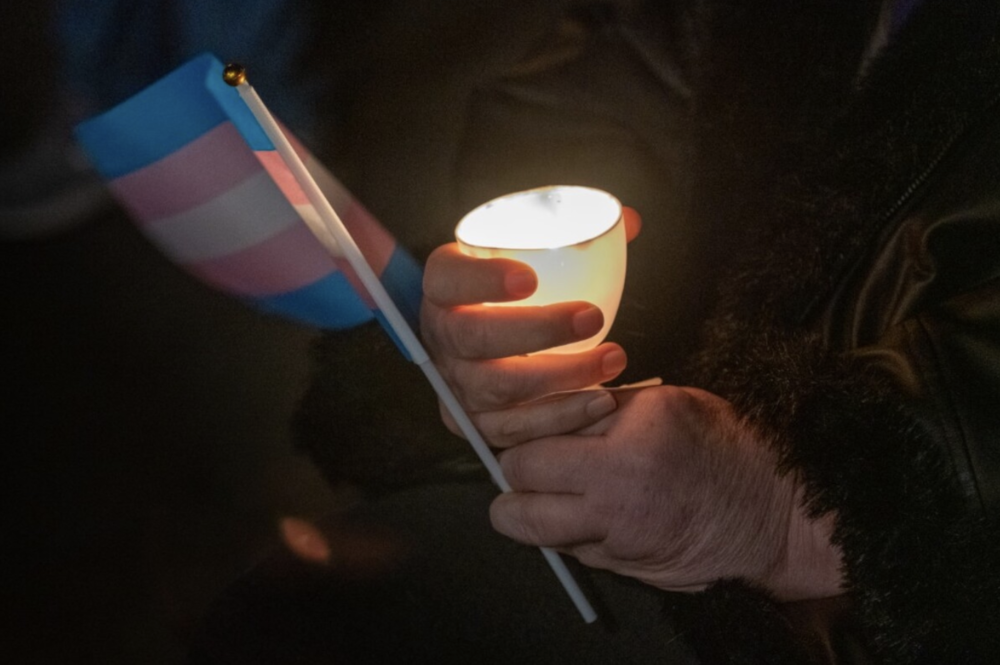A candlelight vigil at St. Mark’s Episcopal Church in Louisville, Kentucky, memorializes transgender individuals who’ve been targeted or murdered for being who they are. Nov. 20, 2023. Photo: John Nation
On Nov. 20, Episcopal churches nationwide will observe Transgender Day of Remembrance by holding special worship services and prayer vigils to memorialize transgender individuals who’ve been targeted or murdered for being who they are and to raise awareness of violence against trans people.
“There are a lot of days where I’m terrified to leave my house, so knowing that Episcopal churches are somewhere I can always go and be safe is amazing,” Rocky Vanderford, webmaster for St. Mark’s Episcopal Church in Louisville, Kentucky, and a trans man, told Episcopal News Service.
St. Mark’s, in partnership with several local nonprofits and faith groups, will host an evening vigil on the 20th and a fundraiser at Highlands Community Ministries, with proceeds benefiting Mandala House, an LGBTQ+-affirming outpatient mental health facility in Louisville. The money will be added to a mental health grants fund for trans people without health insurance.
“A lot of people within the trans community, especially trans people of color, have a harder time accessing the resources they need when they’re visibly trans … in terms of employment and housing and health care access,” Vanderford said.
On the 21st, St. Mark’s members will attend a community Q&A panel discussion on trans issues at Mandala House.
The term “transgender” refers to an individual whose gender identity, expression, or behavior does not conform with the person’s assigned sex at birth; nonbinary reflects a gender identity that is not strictly male or female. The terms are often associated with each other but are not interchangeable.
Luminaries bearing the names of transgender people who’ve been murdered are lined in front of St. Mark’s Episcopal Church ahead of its Nov. 20, 2024, candlelight vigil observing Transgender Day of Remembrance. Photo: Dick Arnspiger
Worldwide, 281 trans people – including 31 in the United States – were murdered between Oct. 1, 2024, and Sept. 30, 2025, though the exact number may be much higher, according to the latest data compiled by the Trans Murder Monitoring Project, an initiative of the Berlin, Germany-based Transgender Europe. Most victims were Black or brown.
In Russellville, Arkansas, All Saints’ Episcopal Church will host a candlelight labyrinth walk on Nov. 20 in the parish hall. Names and photos of trans people murdered in the last year will be projected on screen, with participants asked to reflect silently on their lives while walking the labyrinth.
Jana M. Hall, co-coordinator of the labyrinth walk and an All Saints’ parishioner, told ENS that the church is working to establish relationships with Arkansas Tech University students and the newly formed local chapter of the nonprofit advocacy organization Parents, Families, and Friends of Lesbians and Gays, or PFLAG. She hopes the relationships will make LGBTQ+ community members aware that they are safe to be themselves at All Saints’.
“We’re in a small town in rural Arkansas, so there’s a lot of struggle and a lot of hatred and a lot of fear going around as trans people try to live their daily lives,” Hall, who has trans siblings, said. “Not everyone has a solid support network, but we can try to be that for them.”
Out of 1,012 bills introduced nationwide in 2025 by federal, state and local legislators targeting LGBTQ+ rights, 124 have passed and 506 remain active. This is the sixth consecutive record-breaking year for the total number of proposed anti-LGBTQ+ bills, according to Trans Legislation Tracker, an independent research organization that tracks bills affecting anti-trans and gender-diverse people in the United States.
Many trans Americans and their families are moving to more LGBTQ+-affirming states or, if they can access passports, to other countries for safety reasons and in response to President Donald Trump’s executive orders targeting transgender rights, including limiting access to gender-affirming care for minors, according to Rainbow Railroad, a global nonprofit that helps LGBTQ+ people move to safety. Latoya Nugent, Rainbow Railroad’s head of engagement, told Time Magazine in an interview that the organization has received a record-high number of relocation assistance requests from U.S. citizens since Trump was elected a year ago.
However, not everyone can move because of financial constraints, family ties and other reasons. That’s why it’s “really important” for Episcopalians not only to support trans and nonbinary people at church, but also through political advocacy, Aaron Scott, The Episcopal Church’s gender justice officer and a trans man, told ENS.
“Episcopalians need to ground ourselves in whatever we’re doing in our congregations and communities and support policy at every level – local, state and federal – to help everybody access gender-affirming care and establish and strengthen all LGBTQ rights,” Scott said.
For example, General Convention in 2022 passed Resolution D066, which calls on Episcopalians to advocate for policies that support gender-affirming care for people of all ages, including minors.
Scott has been working with the church’s Office of Communication to build a social media campaign in support of transgender people, which will launch on Nov. 20. The campaign will include a blessing video by the Rev. Cameron Partridge, rector of St. Aidan’s Episcopal Church in San Francisco, California, and a tribute to three trans Episcopal leaders who have died in recent years: the Rev. Gari Green, a founding member of TransEpiscopal, a group that advocates for more inclusive church policies toward transgender people and creates supportive spaces for trans Episcopalians; the Rev. Iain Michael Stanford, a member of TransEpiscopal who co-led advocacy efforts to add “gender identity and expression” to The Episcopal Church’s nondiscrimination canons for access to the ordination process at all church levels of leadership; and the Rev. Vicki Gray, the first openly trans person ordained in the Diocese of California.
“I miss each of these friends very, very much, and I think of them in the great cloud of witnesses standing with us,” Partridge, a trans man, told ENS. “I don’t know anyone who’s not impacted deeply, internally, emotionally, spiritually by the targeted attacks that are coming at us in various forms of violence in the wider world.”
Partridge said he will spend Transgender Day of Remembrance at a gathering at San Francisco City Hall. The group of activists will march to a nearby LGBTQ+ center.
“Organized action, active prayer … all are super important on Trans Day of Remembrance and beyond,” he said.
The day of remembrance was first observed in 1999 in response to the separate murders of three Black trans women in the Greater Boston, Massachusetts, area: Chanelle Pickett in November 1995; Monique Thomas in September 1998; and Rita Hester in November 1998. Hester’s unsolved murder sparked the day of remembrance. The Nov. 20 international observance concludes Transgender Awareness Week, Nov. 13-19. The day of remembrance is distinct from International Transgender Day of Visibility, which takes place every March 31 to celebrate and acknowledge transgender people and their contributions to society.
-Shireen Korkzan is a reporter and assistant editor for Episcopal News Service. She can be reached at skorkzan@episcopalchurch.org.


